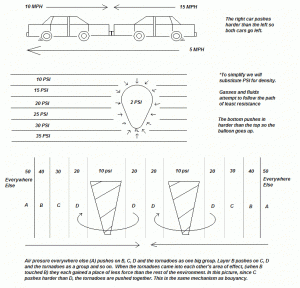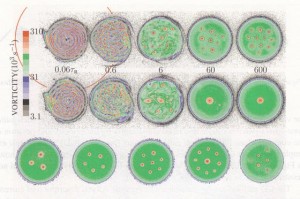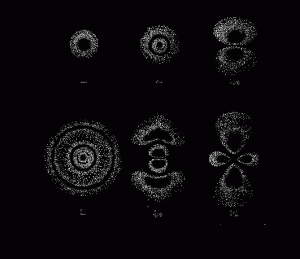SGMS’s Big TOE
Published by Shiva under Uncategorized on January 15, 2010That’s Theory Of Everything to those counting.
This TOE encompasses not just an explanation of physical phenomena but provides a physical model for the spirit world and consciousness. This is the only TOE I know of that does that and it’s certainly the only one that really has zero hocus pocus.
If you listen closely enough you’ll hear the echoes of the commonalities of every ancient philosophy and religion. From the concept of Anima and Gaia, to the gods and goddesses of greek/roman mythology. From Taoism and the balance of chaos and order to clips of the vedas. It is also very strongly in line with many Pythagorean truths.
The largest problem most will have with the theory is the starting point: Aether. We have developed very little in the area of physics in the past one-hundred years in contrast with the previous years. When considering all we understand of physics, what has been developed in the field during the relativity era is a tiny rider on top of what came before. During those years when most of electromagnetic theory was developed, Aether was a forgone conclusion, no scientist in their right mind would ever suppose that a wave can exist without a medium.
A wave is not a physical thing. It is the changing property of something else. It is a concept and does not actually exist per se. Just like temperature does not exist and sound does not exist except as concepts used to describe an amount of heat energy and a measure of perturbations of air. A wave is simply a description of the way kinetic energy is passed between particles of a substance. IE Concentration and rarefaction or squishing and stretching of a substance as it seeks equilibrium. It is particle motion. This is why, once they discovered that light was a wave, scientists knew there had to be a substance carrying the wave or there would be nothing to experience the wave. Any other assumption is utterly without example, basis or explanation and completely irrational and unscientific in the extreme. It is pure faith without reason. Most people do not know the extreme controversy around relativity that raged for over fifty years was only ended when universities started firing those who did not conform.
Here’s the important part though: E=MC2 is correct. Most of relativity is actually correct and was mostly an agglomeration of all the previous science into a single work. The matter and energy equivalence was actually worked out by a number of scientists before Einstein. Almost all the calculations in relativity were created by someone else. Poincare, Lorentz, Maxwell and many more. Einstein simply eliminated Aether, used all these other theories and slapped his name on it. He didn’t even cite the original contributors and scientific process was well establish by that time so it was considered plagiarism not to have done so. But this isn’t a lesson on history…
So what does all this mean? Simple, there is a black thread of faith and irrationality that has crept into physics and is woven so tightly in it that it’s nearly impossible to dig out. A great deal of physics is correct but all the magical multi-dimensional spooky effects are all artifacts of this thread. I’ve searched for magic my entire life and when I was more a faith-based person I loved that science had these fascinating possibilities. I was crushed to learn that it was all part of the same single mistake. I was devastated to learn that there was no scientific evidence for anything supernatural at all. Not even a little. No time travel, no spooky entanglement. No strings. No observer-based control of the universe. Imagine my existential angst!
Further info at www.anti-relativity.com
Now that I’ve gotten you over the biggest hump I’m going to have to speed things up… a lot.
What we have is a substance that all things are made of called aether. It is the densest substance in the universe. All matter is made up of rarefied aether. What this means is that what we think of as super dense and heavy objects are actually exactly the opposite when contrasted with the substance they are made from. Basically bubbles but far more complex. The reason they are not crushed is because of the kinetic energy stored in them primarily in the form of rotation. Each atom is a complex toroid-like structure. A donut-shaped vortex. The centrifugal force of the particle rotation offsets the exterior pressure such that a vacuum or near vacuum of aether is created. What this means is that matter and energy are one thing and there is only one kind of energy and that is kinetic energy.
The best analogy is to think of a tornado. The rotation causes the air in the center to become so rarefied that a near vacuum can occur but the rarefaction is not localized only to the center, it extends out away from the vortex in a gradient. So when you see a tornado you think of the funnel cloud itself but the tornado exists in a much larger area. The thing you see is only a border condition dealing with the amount of vacuum created. Because of this fact, tornados are drawn to each other and will actually merge. This is because of buoyancy and can only be explained well by a picture. This is the same effect that causes gravity.
Magnetism and Electricity are another form of variations of aether density. Though I have not yet worked out which is rarity and which is density and I believe it may be more complex than that. It may instead have more to do with a configuration of alternating areas of density and rarefaction.
Going back to atomic structure and toroidal vortices, there is another component that must be understood to tie together this model. Vortices give off waves as they transfer energy to the ambient medium and waves pump vortices as they transfer their straight-line motion into circular motion. A standing wave in a medium is accompanied by alternating vortices in that medium. They exist together because of the “gearing” effect that is present in fluids. This gearing effect can be seen in the necessity of a vortex being created as water flows down a tube. The rotation reduces the overall friction allowing the water to flow faster and more smoothly.
So in effect, wave particle duality is simply an interchange of states not a simultaneous description. Particles are vortices, vortices are circular waves.
Another important evidence that brings things to light is the spontaneous formations of vortex crystalline structures observed in plasmas. This bears import wrt the basic crystalline structure of solids. What happens is that when vortices are created in a non-neutral plasma, they eventually arrange themselves into well known crystalline configurations including a central vortex with a single vortex circling it.
Particles are not simple toroids but are in fact complex structures of multiple vortices. They are also simultaneously standing waves. To go further the next understanding necessary is cymatics. It is the study of mechanical waves(sound) on fluids or other flowing substances. Though many videos are available, very few show the internal vortices present in the extremely regular structures created. http://www.youtube.com/watch?v=fCXZF3NiPIk
at 1:10 there is a good capture of some of the internal rotations. This image is a representation of the structure of an atom. You will notice the areas and shape of rotation exactly match the “electron distribution” map well known in quantum physics. Most orbitals are likely transitional states as the standing wave transitions between states but the 3d orbital in particular is easily made out in the previous video. Notice the infinity symbol shape actually matches particle motion.
More complex particles which are of a higher frequency will have more internal vortices. These internal vortices are electrons.
The music of the spheres is revealed in the fact that cymatics depends upon not only frequency but the perfect combination of frequency and amplitude to achieve a stable structure. It is also very dependant upon the reactivity of the substance.
A standing wave in the center of a fluid must necessarily create a toroidal vortex to allow particles to gear past eachother as the flows go in and out from the center. This causes symmetrical patterns to arise which are dependant upon the number of standing waves present within the vortex IE the frequency. The amplitude of those waves must be in proper relation to the size of the toroid.
The combination of thesecomplex flows and proper combination of wave height (amplitude) to vortex height gives rise to an infinite flywheel device that is managed by the ambient pressure of aether upon the whole structure. Only waves which are the right amplitude and harmonic can remain in the structure, any other wave will eventually be ejected from the structure. (Taking up and giving off electrons)It seems there may be a one-to-one relationship of standing waves and internal vortices. From this beginning explanation, a creative mind can see how all of quantum physics takes on new meaning.
The periodic nature of all atoms and the harmonics associated now make perfect sense and give rise to a reason why these base eight relationships exist in atomic structure. The diatonic scale. Everything falls perfectly into place. No magic, no hocus pocus or mumbo-jumbo. (did you know dark matter was invented to “fix” why relativity cannot explain the rotation of galaxies and has never been detected in any other way than simply assumed to be there?)
So now we’ve fixed physics and all the magic is gone. How on earth could this give rise to spirituality???
We must first break down our assumptions about consciousness and what can contain it and what can have experience. We’ve probed the brain in so many ways that all the mysteries are very quickly disappearing. There is a machine that after being given three calibration nouns can guess what noun you are thinking with ~80% accuracy. They have implanted brains with chips that have allowed quadriplegics to control a cursor on a computer screen with thought alone. They’ve taught monkeys to control prosthetic arms with thought alone after some minor implants. Stimulate the correct part of someones brain and they will cry laugh or physically attack you. It’s been done.
A single ant from a colony of army ants will endlessly circle a table when alone, but ant colonies perform the most efficient form of resource exploration and discovery as a group. Exploring fifteen(if I remember correctly) degree increment spokes on an exploration pattern that eventually covers a large circular shape and then upon completion move to a semi-random location at a proper distance from the previous location to begin again. Some have seen the ants pour into obstacles such as small streams and walk across on the dead entangled bodies but then go up into trees to cut leaves to use as boats when confronted with a larger river. Collective intelligence.
We are made up of individual neurons and the loss of a great deal of them does not interrupt our sense of self. We are not a single neuron but something that only exists as a collection and relationships between the collection. Furthermore and more importantly, the firing of neurons is a process of alternating between chemical and electrical signals and these happen in a loop formation between the thalamus and cortex.
We are a loop of electrochemical energy. That loop driven and directed by the shape of the connection of the neurons and upon passing changes the shape of the connection. Just as a river moves a stone so does the stone move the river.
The best explanation of our experience is to simply say we are energy in a loop and the configuration of that energy and the complexity of it gives rise to experience. Experience seems to be an electrical phenomenon. Given the previous explanation of what matter is, everything is an electrical phenomenon. That is to say, aether in motion is experience. If we are complex loops of aether then couldn’t any loop of aether have some sort of experience somewhat similar to our own. Could we not see the magnetosphere of the earth as thalamo-cortical loops? The same true of the sun? And of the other gods such as Jupiter?
If we have not begun to properly detect aether because of our ignorance of it, could there not be free-standing smaller loops that do not have the energy and compactness of a single atom (and yes every atom might be a mind) that we would not be able to detect other than via electromagnetic fluctuations but may have experience and though just as we do?
In addition when a tree grows it is influenced by the way the wind hits it, the way the water flows near it and every event is captured in its growth pattern. As it moves water and sap through itself in yearly cycles does it not pass electromagnetic substances through a specific pattern? How is this not equivelent to memory? The tree grew the way it wanted to grow. What it wanted was dictated by experience and genetics. How are you different?
This is all very metaphysical but at the same time explained in a very mechanistic physical way. Given a more accurate view of physics and an improved view of human experience given to us by modern biology (which has no magical theories in it) we can see that the idea that “everything is mind” may have some roots in concrete fact.
What I’m saying is that everything is one thing. Everything interacts via touch and mechanics. Everything is so complex it seems random but it is in fact the butterfly effect from a level even smaller than we can yet probe. That every mind is made of many smaller minds. That everything is intricately connected and interrelated. I’m saying “as above so below”
There is no magic; nothing that cannot be explained. The unexplained simply hasn’t been properly understood yet (or recently anyway) Nothing happens without a reason. Even though existing as a spirit might be possible it con only be so if there exists somewhere somehow an explanation that works with the rest of reality. Everything works.
Phew! That’s the shortest answer I can give to the meaning structure of life the universe and everything in a single sitting. I’m sure I can do it better given some time though! 😉



